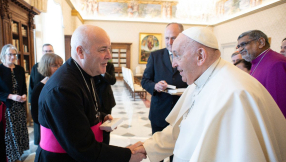Church minister and domestic abuse victim
Our courtship bore no indication of what would transpire within the marriage. There were no warning signs. And yet within a very short period of time the relationship turned abusive. My spouse started having violent mood swings. Hot and cold drinks would be thrown over me, full dinner plates would be smashed over my head, any work I did within the church would be mocked, I would forcibly be told of my own worthless and uselessness. I felt alone, full of despair.
I considered myself a fraud because once we took on a public persona, we portrayed our marriage as a perfect Christian example to our congregation. People never know what truly happens behind closed doors and this is just as true for church ministers as it is for anyone. This cycle of abuse continued for nearly 18 years, deeply affecting my own emotional, mental and spiritual health. The effects of it still impact my life today.
Martial domestic abuse is not the taboo subject it once was. An estimated one in four women will experience spousal abuse and there are over 7,500 safe places for women in the UK. But one thing I haven’t mentioned yet is that I wasn’t the victimised wife. I was the victimised husband. My wife was the perpetrator of the abuse. This changes things. There is greater stigma attached in being a male victim than with other society taboos. Around one in six men will experience domestic abuse in their lifetimes and yet, currently there are only 60 spaces of refuge.
I’m not the stereotypical image you may think of for a beaten husband. I’m not a person who can’t stand up for myself. I consider myself a ‘man’s man’. Despite the provocations, however, I never hit back. I never responded with violence because I have always believed that hitting anybody, whether male or female, is wrong.
The experts say you should walk away the very first time you are hit because once you stay, you are showing acceptance of the situation and giving the abuser permission to continue. For me at least, it wasn’t that easy. I’d taken vows that I took seriously. As a church minister, part of my role was to promote and uphold the sanctity of marriage. How could I explain to people that I’d walked out on my wife because she was violent? I would be a laughing stock - ‘there’s the man that couldn’t control his own wife.’
I’d even overheard my own bishop joking about domineering wives and ‘weak husbands’. I felt even then, that no one would understand my situation and that were I to divulge what was happening, I would probably be accused of over elaborating on a martial tiff. I reasoned that this was what ‘for better, for worse’ meant and part of the sacrifice I was to make for the cross of Christ.
Over the years, another pattern of abuse emerged. Without any prior antagonism, I would be forcibly removed from my own home. At first, I’d be allowed to return to the martial home a couple of hours later when the anger/frustration had burnt itself out. This evolved into being the next morning. After 18 years I finally chose not to return after another violent eviction.
When the church authorities were made aware of the martial breakdown, they refused to acknowledge the issues involved. I was instructed ‘to return to the martial home and reconcile our differences’. That might have been suitable advice had I raised concerns after six months, but was most inappropriate after enduring eighteen years. I felt they did not want to believe the possibility that domestic abuse also takes place among church ministers.
If anyone is reading this now, and recognises part of their own story within these words, I can guarantee that you will be making excuses for your partner’s behaviour. Often, that is the first method of coping with the trauma. I can guarantee that at some point, you will run out of excuses. I eventually did but it took many years to arrive there.
I would recommend writing your own journal of your experience. This was the defining moment in my journey. As I reread my account, it finally dawned on me how horrific my situation was. Although I knew it to be true, it read like fiction and I thought that, come the moment when I shared my journal with others, they would not believe it. So I also incorporated photographs taken with a mobile device into the journal. This is a very personal document that eventually I was able to share with some church leaders who were able to understand and support me in my recovery. For me, the most important aspect has been other people’s acceptance of my reality. From there, with help I can move forward.
The author of this article has asked to remain anonymous to protect his children.
On the web:
thesilenceofdomesticviolence.blogspot.com
www.mankind.org.uk













